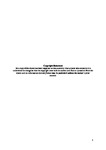The assessment of selected novel feed ingredients to replace fishmeal on the nutrition and health status of ornamental fish
| dc.contributor.supervisor | Simon , Davies | |
| dc.contributor.author | Mark , Rawling | |
| dc.contributor.other | Faculty of Science and Engineering | en_US |
| dc.date.accessioned | 2014-05-16T09:33:45Z | |
| dc.date.available | 2014-05-16T09:33:45Z | |
| dc.date.issued | 2013 | |
| dc.date.issued | 2013 | |
| dc.identifier | 800898 | en_US |
| dc.identifier.uri | http://hdl.handle.net/10026.1/3026 | |
| dc.description | Chapter 3 has been published in the Journal of Fish and Shellfish immunology and Chapter 5 has been published in the Journal of Aquaculture | en_US |
| dc.description.abstract |
Four investigations were conducted to assess the effects of feeding selected novel feed ingredients on the nutrition and health status of ornamental fish. Each dietary ingredient was assessed by determining the effects on growth performance, feed utilisation, haematological status, serological status and immuno-competence of mirror carp, a model ornamental fish species. The first experiment was conducted to evaluate the effect of feeding a tropical earthworm meal (Perionyx escavatus) and soybean meal on the haemato-immunological response and growth performance of mirror carp (Cyprinus carpio). Fish were fed diets for a total of 88 days, fishmeal served as the main protein source in the control diet. Two remaining diets consisted of fishmeal fixed at 33 % provision of protein and the remaining 66 % protein was provided by soybean meal (SBM diet) or P. excavatus meal (EW diet). After 60 days of feeding fish fed EW diet showed a significant elevation in final body weight compared to fish fed a fishmeal diet and fish fed a SBM diet. Similar improvements were observed in feed utilisation efficiency. After intraperitoneal injection with heat inactivated Aeromonas hydrophila and 28 days of feeding EW diet to mirror carp showed decrease in some aspects of the innate immune response. Contrary to this, fish fed soybean meal showed signs of inflammation. The second experiment was conducted to evaluate the effect of feeding two plant protein concentrates and a combination of whey protein concentrate and casein protein on the growth performance, haematological and serological responses of mirror carp (C. carpio). Fish were fed diets for a total of 84 days, fishmeal served as the main protein source in the control diet. Three remaining diets consisted of fishmeal fixed at 33% provision of protein and the remaining 66% protein was provided by rice protein concentrate (RPC diet), corn protein concentrate (CPC) and a combination of whey protein concentrate (8%) and casein protein (58%) (WPC diet). After 84 days of feeding fish fed WPC diet showed a significant elevation in final body weight compared to fish fed a fishmeal diet and fish fed RPC and CPC diets. Similar improvements were observed in feed utilisation and protein efficiency. At the end of the trial feeding fish fed WPC diet showed a significant elevation in mean corpuscular haemoglobin levels compared to fish fed fishmeal and RPC diets. Serological analysis showed that feeding carp the WPC showed a significant increase in serum albumin and protein concentrations compared to fish fed fishmeal diet. The final experiment was conducted to evaluate the effect of feeding selected exotic ingredients on immune responses and expression of immune related genes in mirror carp (C. carpio). Fish were fed diets for a total of 63 days. Fishmeal served as the main protein source in the control diet and two experimental diets consisted of fishmeal fixed at 34% provision of protein and the remaining protein was provided either by earthworm meal (EW diet) or a combination of whey protein concentrate (8%) and casein (58 %) (WPC diet). At the start of the trial fish were injected intraperitoneally with A. hydrophila bacterin. Compared to fish fed fishmeal, a significant increase in mRNA expression of the pro-inflammatory cytokines IL-1β (24 h post injection) and TNFα (at 12 h and 48 h post injection) was observed in fish fed EW. Moreover a similar trend was observed for complement 3 (C3) gene, where fish fed EW showed significant elevations in mRNA expression values at both 12 and 48 h post injection compared to control fed fish. In contrast, fish fed WPC showed a significant decrease in C3 and TNF-α mRNA expression compared to fish fed fishmeal (48 h post injection). Fish fed EW and WPC diet showed a significant increase leukocyte levels compared to fish fed fishmeal 14 days post injection. Fish fed fishmeal presented significantly higher circulatory IgM levels at 7 d post injection compared to fish fed EW and WPC diets. In contrast, fish fed EW and WPC showed a significant increase in IgM levels at 28 d post injection. This study concludes that feeding fish non-plant based feed commodities had a positive effect on carp growth response, feed utilisation and immuno-competence. These findings are both novel and highly relevant for the ornamental industry where high value feed commodities are more acceptable. | en_US |
| dc.description.sponsorship | Biotechnology and Biological Sciences Research Council (BBSRC)and MARS Waltham Centre For Pet Car and Nutrition | en_US |
| dc.language.iso | en | en_US |
| dc.publisher | University of Plymouth | en_US |
| dc.subject | Haematology | |
| dc.subject | Immunonutrition | |
| dc.subject | Animal Health and Welfare | |
| dc.subject | Fish, Ornamental | en_US |
| dc.title | The assessment of selected novel feed ingredients to replace fishmeal on the nutrition and health status of ornamental fish | en_US |
| dc.type | Thesis | |
| plymouth.version | Full version | en_US |
| dc.identifier.doi | http://dx.doi.org/10.24382/4108 |
Files in this item
This item appears in the following Collection(s)
-
01 Research Theses Main Collection
Research Theses Main


